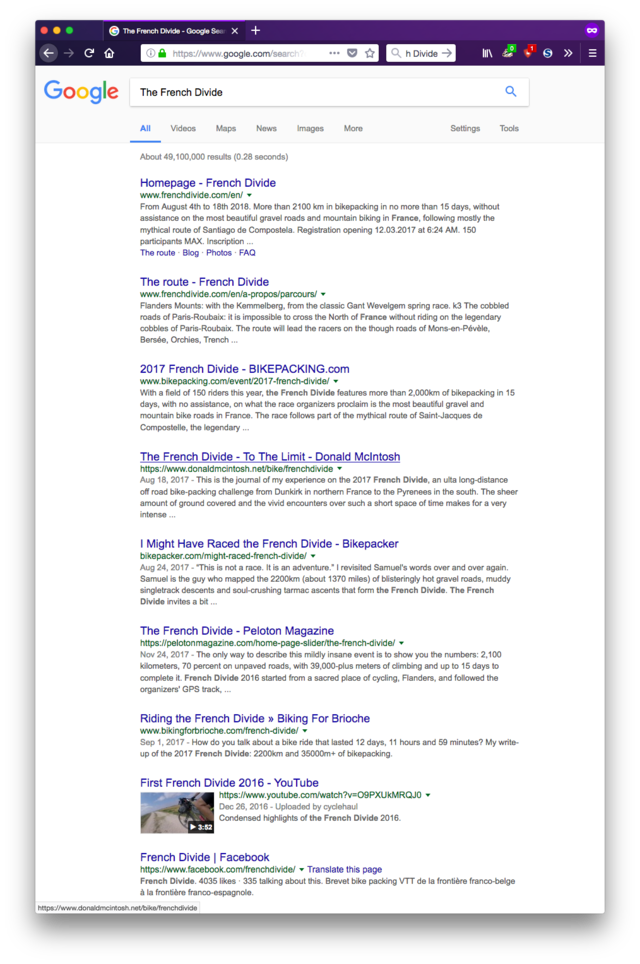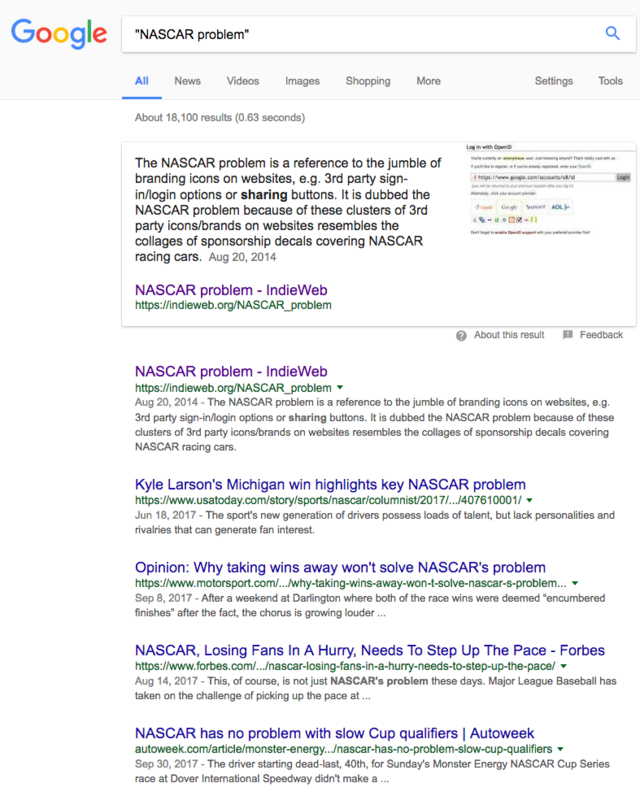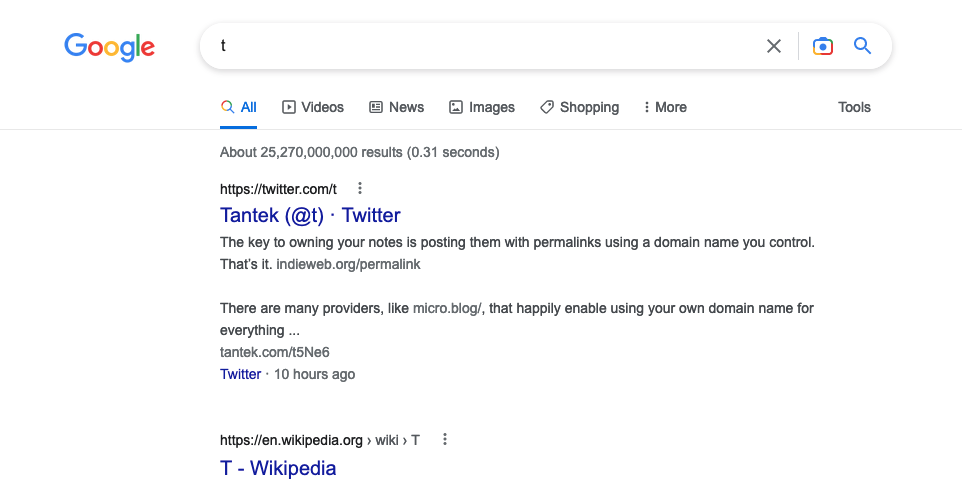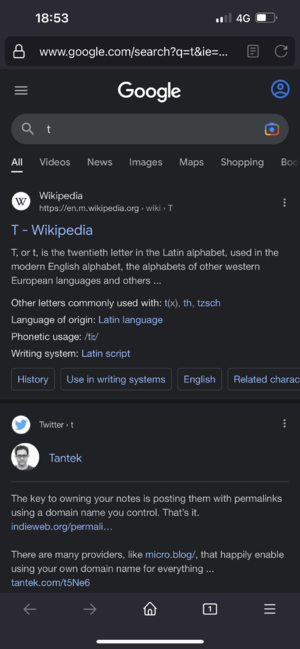SEO
This article is a stub. You can help the IndieWeb wiki by expanding it.
SEO is an acronym for Search Engine Optimization which refers to the practice and results of publishing pages and permalinks on the web in order to rank better (earlier/higher) in web search engine results. In practice IndieWeb sites seem to do better than silos at search engine results.
How to
Anecdotal experience of what does better, in rough order:
- IndieWeb sites with permalinks with slugs of search terms
- HTML over equivalent PDF content
- Silos with permalinks with slugs of search terms
- IndieWeb sites with permalinks without slugs
- Other silo results with slugs of search terms (e.g. silo wikis)
IndieWeb Examples
Notable examples of search terms or phrases showing indieweb results first or in some other highlighted manner such as an explicit preview.
Donald McIntosh
Donald McIntosh's journal of The French Divide beats their official Facebook page, as of 2017-12-30.
Mobile search result from Donald:

Verified by  Tantek Çelik on desktop:
Tantek Çelik on desktop:

Aaron Parecki
(stub)
https://w7apk.com/baofeng beats the PDF version of the same information on another site.
IndieWeb Wiki
The IndieWeb Wiki itself shows up frequently in top search results. Interesting examples:
"NASCAR problem" is not only the first result in Google (as of 2017-11-15), but shown in a preview box with abbreviated text from the page and a screenshot (almost like an encyclopedic presentation)
Tantek
 Tantek Çelik's Twitter account showed up for
Tantek Çelik's Twitter account showed up for  capjamesg in the top position for the query "t" on desktop and the second-from-top position for "t" on mobile on the Google search engine.
capjamesg in the top position for the query "t" on desktop and the second-from-top position for "t" on mobile on the Google search engine.
Google displayed  Tantek Çelik's permalinks back to his original posts. This shows that your domain could show up in Twitter posts that appear on Google, which gives additional incentive to add original post permalinks to your POSSE Tweets.
Tantek Çelik's permalinks back to his original posts. This shows that your domain could show up in Twitter posts that appear on Google, which gives additional incentive to add original post permalinks to your POSSE Tweets.
Desktop
Mobile
Other Wikis
Other wikis used by folks in the community
Articles
- 2009-10-12 : Spammers, Evildoers, and Opportunists (archived)
- Update 1: 2009-10-13 : SEO FAQ (archived)
- Update 2: 2009-10-19 : The Green Hair Theory (archived)
- 2023-11-08 : Everything about SEO is obnoxious (archived): “But the main reason for my ire is that it just plain wrecks the internet.”
- 2023-11-28 : The birth & death of search engine optimization (archived).
- Written inspired by a thread on X by Jake Ward (2023-11-24). Read on Thread Reader. (archived.)
The basic idea is that you use generative AI to systematically churn out articles about a given topic and then use A/B testing to eliminate the ones that don't "work" on search engines in favor of the ones that do. This is a way to automate the process of creating content farms.
Even better, there's goddamn startups around the idea of making tools for SEO people to automate this. Out of morbid curiosity, I decided to try having it write an article titled "How to cheat at SERP SEO using OpenAI to do all the work for you". I've uploaded it here in case you want to see what kind of garbage output it gets.
- The automatically generated article How to cheat at SERP SEO using OpenAI to do all the work for you (archived).
Brainstorming
Publish Good Content At Simple Permalinks
Some of the oldest "simple" advice on SEO for independent websites essentially recommends:
- publish well-written relevant blog posts on a topic
- use well designed permalinks with slugs mentioning key topics
If you do that, people will appreciate your blog posts, and are more likely to want to share them with others, informally (e.g. in messages), and publicly, on their own blogs or social media, which search engines will notice and use as an indicator.
Keeping your permalinks short and readable (less than 70 characters, no random hex digits / UUIDs etc.) make them easier for folks to share, and more likely that people receiving / seeing them will click on them.
See Also
- search
- Derek’s SEO post highly rated by SEO folks on Twitter: https://twitter.com/MatthewJBrown/status/1029790694112546816
- "Here's the 10/10 gold standard, for reference:
http://powazek.com/posts/2090" @MatthewJBrown August 15, 2018
- "Here's the 10/10 gold standard, for reference:
- https://twitter.com/arjunquera/status/1287818063023398919
- "Incredible how much bullshit SEO optimization has brought to the web." @arjunquera July 27, 2020
- https://twitter.com/girlziplocked/status/1207036521565577220
- "The first two pages of a google search almost never surface blogs or personal websites anymore.
Every worthwhile question you could think to ask has been anticipated and occupied by search-engine-optimized by assholes.
The internet hasn't been free for a really long time." @girlziplocked December 17, 2019
- "The first two pages of a google search almost never surface blogs or personal websites anymore.
- Why not to: 2024-01-02 Search Engine Hostility
- Criticism: parasite SEO practices of major news publishers exposed and de-ranked by Google Search: 2024-11-20 Ars Technica: Google stops letting sites like Forbes rule search for “Best CBD Gummies“ / If you've noticed strange sites on "Best" product searches, so has Google.
On the strength of Forbes' long-existing and well-linked site, Forbes Marketplace/Advisor has dominated the search term "best cbd gummies" for "an eternity," according to SEO analyst Lily Ray. Forbes has similarly dominated "best pet insurance," and long came up as the second result for "how to get rid of roaches," as detailed in a blog post by Lars Lofgren. If people click on this high-ranking result, and then click a link to buy a product or request a roach removal consultation, Forbes typically gets a cut.
Forbes Marketplace had seemingly provided its SEO-minded review services to CNN and USA Today, as detailed by Lofgren. Lofgren's term for this business, "Parasite SEO," took hold in corners critical of the trend.




